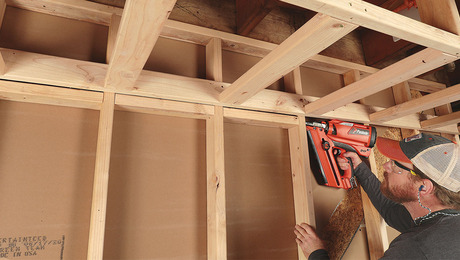Try asking for money up front. We dare you. Commercial work ain’t like adding a rec room for Ralph and Betty.
What kind of work are you quoting a commercial GC?
Speaking of up front money, what kind of up front cash do your material suppliers ask of you? Most of mine will wait 30, 60, or if I am really doing good with them, 90 days.


















Replies
Pete-
Typically in "true" commercial work, there's no deposit, and billing is done once a month on AIA G702 forms.
Upfront, you submit a "schedule of values", breaking the job done by trade, and each month you bill for the % complete for each trade. The bills are usually submitted around the 25th of the month, with the work complete projected to the end of the month. Normally, the owner has 30 days to pay- but don't be shocked if you get strung out for 45-60 days (or more)- especially if you're dealing with corporate-owned companies.
Referencing my comment on "true" commercial work. What I meant is work for corporations, such as building a Waldenbooks in the mall. When you talk about nail salons, or building a bookstore for a Mom & Pop, the billing rules should be a bit more flexible. It really depends who's steering the ship- if an architect's involved beyond the design phase, you'll most likely be following the AIA contract and payment procedures.
Bob
They're pretty standard when the AIA contracts are used, and the advantage is that most architects know how to read them. They break the work down into the schedule of values, and then have columns for "previous total", "changes to date", "current total", "amount billed to date", "amount billed this billing period", "retention", and "amount due this period" (those are moy recollections without the form in front of me).
We actually re-created the form in Excel so it was easier to fill in. If I can find the file, I'll email it to you (it's around here somewhere.....lol).
Bob
If you are furnishing and installing items that really require advance deposit payments, and can prove it, you may have a chance. Otherwise, forget it.
In residential remodeling, when working with homeowners, contractors ask for advances because there is an actual "no trust" element in the relationship. Much of the work is one-time; neither has worked with the other before. Contracts may be weak or nonexistant, and there is the strong chance that without advance money, maybe even serious (one third down or more) advance money, the contractor might get stiffed. Ralph and Betty might decide to not have the job done. They might hire Ralph's brother. Betty might lose her job. An advance sort of solidifies the deal.
Some will probably say that you can very well be stiffed on a commercial job, too. My advice would be that unless your scope is one of the really up-front items (demo, sitework, etc.) that it is best not to actually enter into the contract (review, signatures for execution, insurance, bonding) until after the work has started. It is a good idea also to insist on receiving a copy of the contract between owner and GC, as the GC's contract to you will certainly tier off that one.
Since in commercial work, the payment stipulation always is, "you get paid when we get paid," you will want to see the terms given your customer (the GC) by the owner.
It was my experience in commercial work that the only things that required advances were big-ticket items (custom machinery, etc.) that required substantial engineering work.
Edited 1/27/2004 11:25:17 AM ET by Mr. Micro
Re - paid if/when paid
There's been a bunch of columns in, I think, Walls & Ceilings magazine about that clause. It sounds like it should be expunged from the world. As a sub, you should be extremely careful about the job and the GC if you go for that one. A zillion things totally out of your control could leave you out in the cold, with nothing but an obligation to keep working on the job.